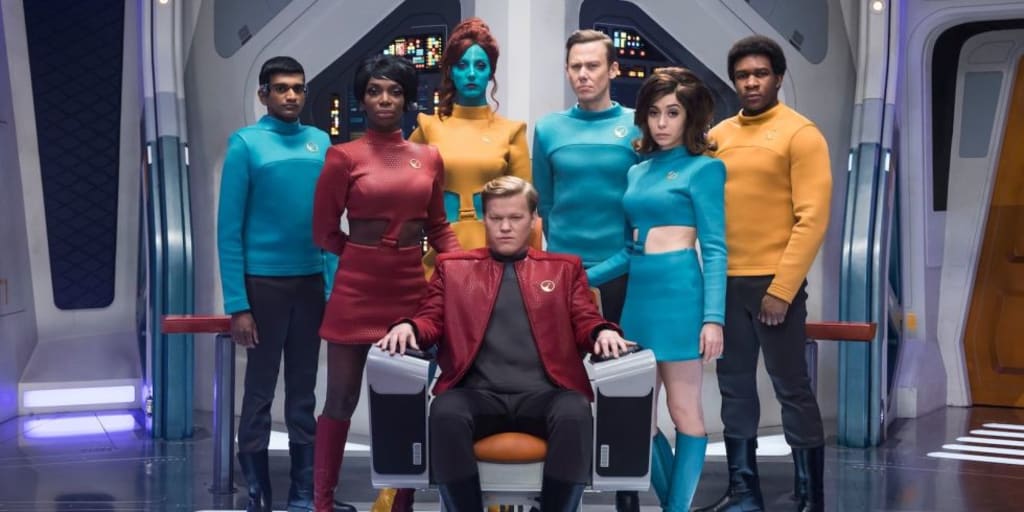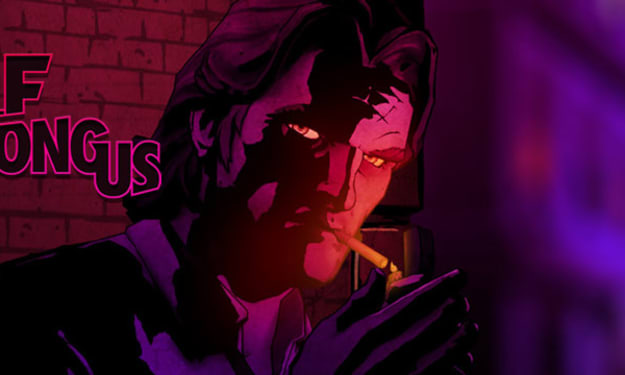
Warning: SPOILERS
Damn. What an episode. If there’s one television series that really makes you think, it’s Black Mirror. It’s a phenomenal combination of great acting, well written stories, and most importantly, an intriguing commentary on the many flaws of modern society and the technology that fuels it. And 'U.S.S. Callister' does all the above at maximum firing capacity.
The driving theme behind this episode is the dangers of online, virtual worlds, which in this case (and in most), manifests in the form of a video game. I thought this did a fantastic job of highlighting just exactly how and why virtual reality can go wrong, without explicitly beating you over the head with it. Not only that, but like a lot of other episodes, it masterfully demonstrates the reality of moral grey area. The two themes intertwine and intersect to deliver an extremely insightful reflection.
Robert’s character is really the cornerstone of the entire episode. Initially, he seems to just be a very socially awkward guy who everyone treats like shit, despite apparently being a genius that created a massively innovative online gaming universe (the genius that creates a tech empire only to get walked all over… sounds familiar). To escape his perceivably terrible life, he plays his own private, modded version of the game. Which initially seems to be fine, until we realize he’s using it as a means of taking out years of built-up anger and frustration on virtual copies of the people in his workplace, and that’s where things take a twisted turn.
Everyone can relate to needing an escape. Whether it be a vacation, or just a weekend with your family, no matter what you do, we all need a break. Some of us can relate to using video games as a means of achieving that. And this is where problems can arise. Video games can get a bad rap as a waste of time, and something that sucks all ambition and “real” success out of your life. And to some extent, this can be true. Like Robert, many people have chosen to spend their free time doing something disconnected from the real world. Achieving things that, for all intents and purposes, aren’t real. But, video games aren’t the only way people do this. Any activity in excess which stops you from maintaining physical, mental and emotional health is detrimental. Anything which disconnects you from everyone around you, slowly degrading your real-world skills and sucking away your ambition is a problem. Generally, this is referred to as an addiction, obviously not exclusive to gaming. Drugs, alcohol, even TV shows, movies or social media, all these things can impede you from living your life fully and making an impact in the world, if not balanced properly.
Over-said and overused, but truly, balance is the key to life in all aspects. Buddhism hits it on the head with the Middle Way. And, as balance would suggest, people do need breaks. But if your whole life is a break, there’s a problem there. And for Robert, that seems to be the case. He can barely socially interact at all to the point of just being a nodding smiling head in his real-world interactions for most of the episode. A lot of people can also relate to this social anxiety. It’s a serious growing issue in today’s society, and technology and the escape it provides seem to be the main reason for it. When we isolate ourselves from real-world interactions, we gradually lose that skill, like anything else. And eventually this can lead even further down the rabbit hole to progressively worsening mental issues, as we see in Robert. It shouldn’t come as a surprise that humans are social beings, and that isolation has been proven to cause mental degradation. Robert clearly has been isolated for a long time, and this, along with the emotional suppression that comes along with it, has seriously screwed up his perception of reality. Instead of confronting people on the issues he has with them, he punishes their virtual form in-game, where he is an invincible god and nothing can go wrong. Instead of pursuing a real relationship with someone he finds attractive, he enslaves their virtual copy so that he can interact with them on his terms, without fear of rejection or hurt. He’s begun to quite literally live inside his fantasy, instead of taking action to alter his reality. And that’s where escapism becomes a problem, as the line between real and virtual are blurred to the point of being indistinguishable.
It’s at this point the episode really begins to produce some big questions. The biggest one is, is what Robert is doing morally wrong? Robert clearly has mental issues, that’s for certain. But is this fantasy life and “enslavement” of virtual copies of his co-workers morally wrong? Given the sheer realism of the virtual reality in the show, one is inclined to say that Robert is committing some seriously fucked up stuff here. But is he really doing anything at all? We all have fantasies of one kind or another. I’m sure we’ve all imagine beating the shit out of someone (or worse) at some point in time. Is doing it in a world that doesn’t exist, with images that are just really a bunch of 1’s and 0’s in a computer, something that is morally wrong? And that is a question to which there is no right answer. I would assume the majority of people, myself included, definitely felt uncomfortable watching parts of the episode (again, hats off to the actors on that one, particularly Cristin Milioti who plays Nanette). And by the end of it, the episode is certainly portraying Robert as a villain, which the majority would be inclined to agree with. But where do we draw the line between fantasies and reality, as virtual reality becomes increasingly photorealistic? Do computers and A.I., “virtual lives” so to speak, have any real human rights? In addition, if reality is becoming increasingly virtual, is escaping into that virtual side a product of mental illness, or just a new way of living? Once thought of as just science fiction, the exponential development of technology means we are confronted with what can be very disturbing questions.
I would argue that Robert is wrong in what he is doing, simply because it’s one thing to have a thought or fantasy, and it’s entirely another to decide to act it out. Intent is the primary factor here. Running around GTA shooting people isn’t that disturbing if you’re just doing it in a comedic light as part of the game. Using it to fulfill your fantasies of legitimately doing it in real life, on the other hand, is, I would argue, very unhealthy. Sure, it’s better than actually going around shooting people, but how long before that becomes your reality? Fueling an underlying mental issue without addressing it properly is going to lead to bad things happening, one way or another. For Robert, it ended when his virtual slaves turned against him, and trapped his mind in the game. The ending shows two polar opposites, the real, physical demise of Robert, and his virtual co-workers being able to freely explore the in-game universe. It’s done in an almost feel-good, campy, happy go-lucky way, so that you are rooting for the virtual beings, while Robert is assumed to eventually die in his coma, with his mind trapped in the game and likely no one finding him lying there for at least a few days, since it seems he has no friends or family. And so, we find ourselves rooting for the virtual people’s success, and Robert’s legitimate death. How fucked up is that? Yes, he was mentally ill and lived out his fantasies in a very unhealthy manner. But again, do those 1’s and 0’s have more significance than a human life? Did he ever harm or disturb any actual, real, human people? Did he deserve to die for what he was doing? I’m going to answer with a resounding no on that one, and hope that the majority of people agree, despite how well the show manipulates your feelings.
The ending juxtaposition honestly had me feeling sick as I realized all of that, which I assume was the intended effect. Again, masterful work by the Black Mirror crew, truly. We end up with more questions, like the autonomy of A.I. and the always feared “robot apocalypse”, but also the more simple idea that unhealthy pursuits will eventually bring about your downfall, one way or another. Any vice can cause it, and there have been numerous reports of actual deaths from extended gaming sessions, never mind countless deaths from drugs, alcohol, etc., so the idea of death by gaming or death by vice is nothing new. And the idea of vices themselves are nothing new. But dealing with virtual vices like video games, social media, pornography and so on are one of the many new challenges that the development of technology has brought with it. As governments struggle to deal with governing the virtual world, so too do we struggle to deal with governing ourselves within it. The freedom and the power that comes with it can be appealing. But it’s up to us to keep ourselves in check, otherwise we can easily slip away from what we know as the real world, and become a hollow shell of what we once were. Maybe, eventually, everyone will go that way as technology continues to progress and society becomes increasingly indulgent. But it’s up to us to decide for ourselves whether or not we want to end up like that.
The reality of life is suffering, no one denies that. No matter where you are in life, there will be suffering. If there is no one making you suffer, chances are you’ll make yourself suffer, in one way or another. It’s human nature. We need challenges to overcome, we need pain and sadness to feel the relief and joy that comes after. Balance. When you take all that away and just live in a fantasy, you’ve corrupted the very heart of life. Over-indulgence is a suffering in and of itself. All progress ceases, nothing new is created, and you float on disconnected. Most importantly, you’ll never really feel happy. Just like Robert, you’ll never be satisfied, even within your fantasy. Because nothing has changed, and all the problems that you hid from are still there. It just becomes a vicious negative feedback loop, where the more you hide, the shittier you feel, and the shittier you feel, the more you want to hide. I’ve been there, and I hate it. Maybe you can relate as well. The only way to break it, is to just stop, as hard as it may seem. If you’ve lost all confidence and the ability to solve real, big problems, then just start small. Depending how disconnected you are, even the smallest things like making yourself food, exercising, or deciding to smile and say hello to someone you don’t know today can make a huge difference. And you work yourself up from there. If you haven’t become lost yet, then make the conscious decision never to be so. Make sure you have real things to do in your life, real goals, real accomplishments you want to achieve. Break them down as small as you can so that you can eventually achieve them. And yes, give yourself an escape every once in a while, but leave it at that. Don’t make escape your life. We fill our lives with so much noise, and this drowns out our thoughts and goals. It’s important to take a step back, unplug from everything and just think. Ask yourself, “What is it that I want to do?” and do it. Don’t just get caught up in repetitive, detrimental habits that turn life into a grind. Always be conscious of what it is your doing and where it is you want to go. And remember that above all, regardless of what we create or achieve, it’s all relatively meaningless without others. All of us together, as a human society and race, are equally important and valuable as a unique part of the whole. But without each other, without interaction, help, feedback, talks, shared experiences both good and bad, we really do become lost. And if we only ever create and do for ourselves, we will never be happy. This is something so simple and so fundamental, but often overlooked and forgotten. A lot of the mental issues that seem to be becoming increasingly popular within modern Western society come from exactly these things: over-indulgence and isolation or lack of community.
Technology, like anything else, can be a great tool to aid us in making our lives truly better. It has exponentially improved efficiency to the point of making some jobs obsolete (a topic for another day, as this post is bloated enough as it is), and allowed us to do things previously thought impossible. But we need to be aware of its many downfalls, and do our best to consciously avoid them. Using technology to truly improve our lives does not mean using it as a means of escape into fantasy and isolation. Living your life to the fullest is the same as it’s always been, with or without technology, and technology is only an issue when we let it impede us from doing so. We must stay in control of ourselves and ensure we never lose sight of the fact that the only thing that really matters is real human connections and relationships, and how well we can work together to build a better future for each other, without becoming lost along the way.






Comments
There are no comments for this story
Be the first to respond and start the conversation.